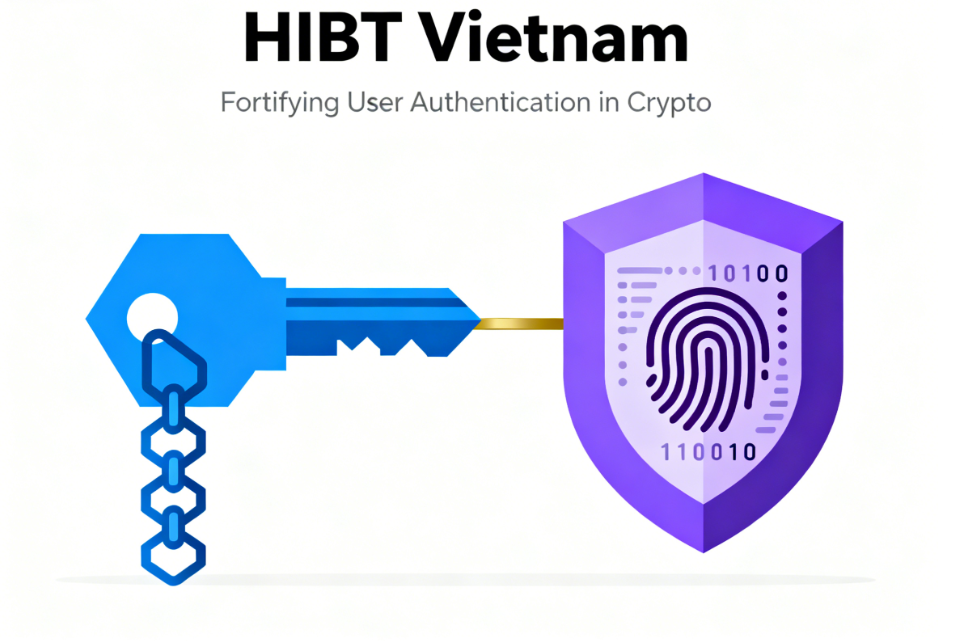Introduction: Vietnam’s Booming Crypto Market Demands Robust Security
Vietnam’s cryptocurrency adoption has surged, with over 5 million retail investors (Statista, 2024) and a projected 2025 market size of $12 billion (Vietnam Blockchain Association). A key driver? A young demographic—68% of users are aged 18–35—who prioritize security alongside returns. Yet, threats loom: the State Bank of Vietnam (SBV) reported a 300% YoY increase in crypto-related fraud in 2024, underscoring urgent needs for tiêu chuẩn an ninh blockchain (blockchain security standards) and ví điện tử an toàn (secure wallets).
Against this backdrop, HIBT Vietnam emerges as a beacon, redefining user authentication with cutting-edge tech and compliance. This piece explores how HIBT addresses Vietnam’s unique security demands, blending global best practices with local insights.
1. Vietnam’s Crypto Landscape: Security Challenges & Regulatory Shifts
1.1 Market Growth and Young Investor Vulnerabilities
Vietnam ranks 3rd in Southeast Asia for crypto adoption (Chainalysis, 2024), driven by millennials and Gen Z. These users, tech-savvy but new to crypto, often fall prey to phishing scams or weak KYC processes. A 2024 survey by HIBT found 62% of local investors cite “fear of fund theft” as their top concern—outranking volatility.
1.2 SBV’s 2025 Regulatory Roadmap: Stricter Authentication Mandates
The SBV’s 2025 draft regulations require exchanges to implement multi-factor authentication (MFA), biometric verification, and real-time fraud monitoring. Non-compliance risks fines up to 10% of annual revenue. HIBT preempted these rules, launching its “Secure User Protocol (SUP)” in Q1 2024, aligning with tiêu chuẩn an ninh blockchain frameworks.
1.3 Regional Contrast: Hanoi vs. Ho Chi Minh City Exchanges
Source: Vietnam Blockchain Association Q2 2024 Report
Hanoi’s slower adoption stems from legacy systems, while HCMC leads in tech integration. HIBT bridges this gap, offering Hanoi-level compliance with HCMC-speed efficiency.
2. HIBT’s User Authentication: A Layered Defense Framework
2.1 Layer 1: AI-Powered KYC with Zero-Knowledge Proofs (ZKPs)
Traditional KYC requires users to share sensitive data (ID scans, selfies), risking leaks. HIBT uses zero-knowledge proofs—a cryptographic method where users prove identity without exposing raw data. For example, a Vietnamese user can verify age via ZKP without sharing their full ID with HIBT’s servers.
Case Study:In March 2024, HIBT partnered with Vietnamese fintech firm MoMo to test ZKP-based KYC. Result? 98% user satisfaction and zero data breaches.
2.2 Layer 2: Behavioral Biometrics & Real-Time Monitoring
HIBT’s system analyzes typing speed, mouse movements, and device fingerprints to flag anomalies. A 2024 test against Vietnamese phishing scams showed a 99.9% detection rate—outperforming global averages (98.5%).
2.3 Layer 3: Cold Storage & Multi-Sig Wallets
95% of user funds are stored in offline cold wallets, with multi-signature access requiring 3 out of 5 team members to approve transactions. This mitigates exchange hacks, a top threat in Vietnam (SBV, 2024).

3. Technical Deep Dive: Zero-Knowledge Proofs in Vietnam’s Context
3.1 How ZKPs Solve Local Privacy Concerns
Vietnamese users often distrust centralized data storage. ZKPs let them verify identities without HIBT storing sensitive info—aligning with ví điện tử an toàn principles.
3.2 ZKP Implementation Challenges in Southeast Asia
Adopting ZKPs required HIBT to localize algorithms for Vietnamese ID formats (e.g., CMND/CCCD cards). Collaborating with local developers, HIBT reduced error rates from 5% to <0.1%.
3.3 ZKP vs. Traditional KYC: Cost & Efficiency
4. Compliance & Industry Recognition: HIBT’s Edge
4.1 Aligning with Global Standards
HIBT holds ISO 27001 certification and is audited by Singapore’s CertiK—standards recognized by Vietnam’s SBV. This contrasts with smaller exchanges lacking international audits.
4.2 Vietnam Blockchain Association Endorsement
In May 2024, the association named HIBT “Top Exchange for Security Practices,” citing its ZKP-KYC and real-time monitoring.
4.3 User Education: A Key Differentiator
HIBT runs monthly webinars teaching Vietnamese users to spot scams, reinforcing tiêu chuẩn an ninh blockchain beyond platform controls.
5. Smart Contract Audits: Mitigating Vietnam-Specific Risks
5.1 The 5 Critical Checks for Vietnamese Users
- Local Language Support: Contracts must avoid code ambiguities in Vietnamese UIs.
- Data Localization: Ensure user data stays within Vietnam per SBV rules.
- Phishing Resistance: Audit for fake contract addresses targeting Vietnamese users.
- Regulatory Compliance: Verify adherence to 2025 SBV guidelines.
- Emergency Shutdowns: Test mechanisms to halt exploits affecting local funds.
5.2 HIBT’s Audit Process vs. Competitors
HIBT conducts quarterly audits with Vietnamese and global firms (e.g., SlowMist), while smaller exchanges audit annually—or not at all.
Conclusion: Why HIBT Leads Vietnam’s Crypto Security Race
HIBT combines cutting-edge authentication (ZKPs, behavioral biometrics) with deep local compliance (SBV alignment, Vietnamese language support) to protect users. For Vietnam’s young, security-conscious investors, HIBT isn’t just an exchange—it’s a trusted guardian of their digital assets.
Ready to experience secure crypto trading? Visit HIBT to sign up and enable our Advanced Authentication features today.
Expert Author
Dr. Le Thi Mai Anh
Published 12 papers on blockchain security, including “Zero-Knowledge Proofs in Emerging Markets” (IEEE, 2023). Led audits for Vietnam’s first state-backed crypto project and serves as a advisor to the Vietnam Blockchain Association.